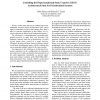Free Online Productivity Tools
i2Speak
i2Symbol
i2OCR
iTex2Img
iWeb2Print
iWeb2Shot
i2Type
iPdf2Split
iPdf2Merge
i2Bopomofo
i2Arabic
i2Style
i2Image
i2PDF
iLatex2Rtf
Sci2ools
ICSE
2004
IEEE-ACM
2004
IEEE-ACM
Extending the Representational State Transfer (REST) Architectural Style for Decentralized Systems
Because it takes time and trust to establish agreement, traditional consensus-based architectural styles cannot safely accommodate resources that change faster than it takes to transmit notification of that change, nor resources that must be shared across independent agencies. The alternative is decentralization: permitting independent agencies to make their own decisions. Our definition contrasts with that of distribution, in which several agents share control of a single decision. Ultimately, the physical limits of network latency and the social limits of independent agency call for solutions that can accommodate multiple values for the same variable. Our approach to this challenge is architectural: proposing constraints on the configuration of components and connectors to induce particular desired properties of the whole application. Specifically, we present, implement, and evaluate variations of the World Wide Web's REpresentational State Transfer (REST) architectural style t...
Consensus-based Architectural Styles | ICSE 2004 | Independent Agencies | Particular Desired Properties | Software Engineering |
Related Content
| Added | 09 Dec 2009 |
| Updated | 09 Dec 2009 |
| Type | Conference |
| Year | 2004 |
| Where | ICSE |
| Authors | Rohit Khare, Richard N. Taylor |
Comments (0)

